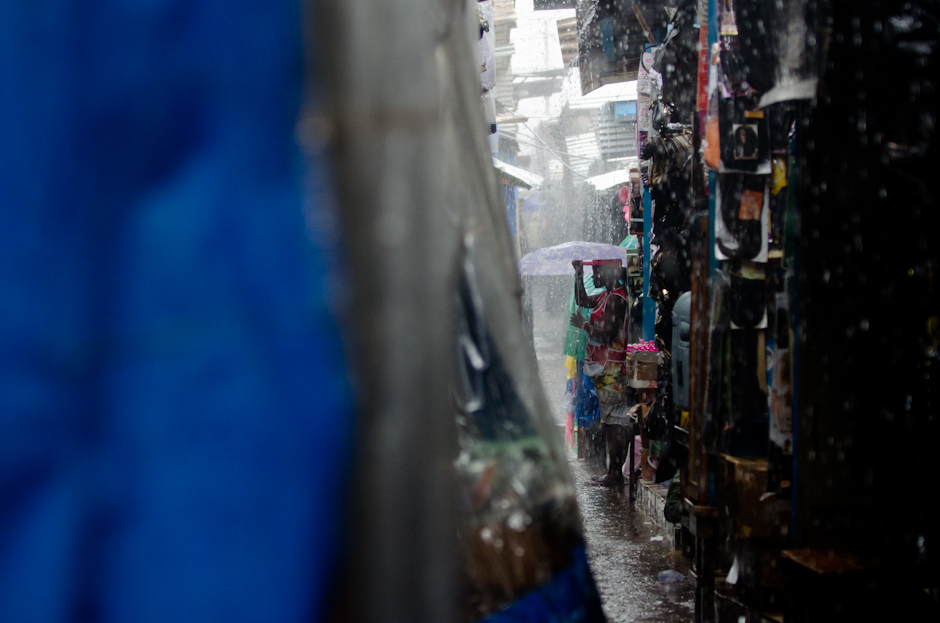We’re lost.
Those two words, standing alone as the rain began to pour, could have stirred a panic. They could have ignited every fear that I had about travelling abroad, and then thrown a bit of gasoline on them for good measure.
They didn’t, somehow, but that didn’t make what happened last Friday any less memorable.
The setting was the Kejetia market in Kumasi, where I, along with Neethu, Michael, and Michelle, had become lost in a sea of shoppers just as a monsoon descended on the humid afternoon. We knew little about what would come in the minutes ahead, other than that we would likely not forget them for as long as we lived.
Even without the monsoon or the misguided steps of four oburonis, the Kejetia market really needs to be seen to be believed. A sprawling set of booths and makeshift shops, it is most widely known as the second largest market in all of Africa. Thousands filter through its narrow pathways every day, buying anything from freshly cut meat to raw fish and even hair wigs.
I got my first look of the market from slightly above ground level, as we approached on a downward sloping road in our tour bus. When we finally settled in front of it, the road was so congested with buyers and sellers that the bus was rendered motionless. We hopped out, and were immediately greeted with the pulsating bass from speakers across the street.
With my blood already racing with excitement, the music only further buoyed my spirits. This was going to be fun.
We formed a single file line as we entered the market, more out of necessity than conscious choice. Making sure to keep my eyes on the person in front of me, I shuffled along slowly, attempting unsuccessfully to fall into rhythm with the rest of the crowd. In the end, I resembled an Arctic penguin more than anything else.
After about five minutes, we stopped to regroup. Some of the group was setting off to look at fabrics, while the rest of us were taking a comprehensive tour of the entire market. I fell into the latter group, and just as we were about to set off once again, I felt a soft dribble on my back.
Thinking at first that it was water, I swung around to see what had happened. In front of me stood an angry shopkeeper, screaming in Twi at our guide. It wasn’t water that she had thrown, but rather grains of rice. Apparently, she was upset about people taking pictures. I wasn’t one of them, but it was a simple case of collateral damage. No harm was done, and the moment was noteworthy simply because it was the only negative social encounter I had throughout the entire experience.
We pressed on, through the produce area, the convenience shops, the fish market and, of course, the meat tents. All along, we took in the sights and smells, with shopkeepers greeting us every step of the way. Though overwhelming at times (the only way to understand how it feels to see hog heads carried by you on a tray is, well, seeing hog heads carried by you on a tray), it was almost universally a pleasant and eye opening experience.
Then the skies opened up.
It started slowly, a few drip-drops mixing in with the sweat that was gathering on my face. I specifically remember thinking, “Well, it would be kind of funny if there were a monsoon.”
I never believed that it would actually happen, or that I would be completely lost when the drip-drop morphed into driving rain that sounded like machine gun fire against the metal roofs of the shops.
But there we were, ambling along as the rain picked up, when I picked up my head and saw none of our group members in front of me. I turned to Neethu.
“I can’t see anyone!”
We picked up our pace and hurried to catch up, but to no avail. We asked some locals if they had seen oburonis pass by, and they pointed us straight ahead. It wasn’t until later that we realized they had no idea which oburonis we were asking for.
Almost simultaneously, we were hit by both the monsoon and the terrifying realization that we were lost. Giving up any hope of finding the group in the pouring rain, we fled for shelter under the roofs of a few different shops.
It was here that we got a healthy dose of the Ghanaian hospitality everyone knows and loves. Despite the fact that the shops were barely big enough to fit the storekeepers themselves, they welcomed us with open arms and allowed us to stand just under the roof so that the rain wouldn’t reach us.
There, we remained for around a half hour. Every time the rain seemed to slow, it roared back to life with a vengeance. To pass the time, Michelle managed to find a dress, and Neethu bought a bottle of Cocoa butter. All the while, the storekeepers watched, barely flinching at the downpour right before their eyes.
As with the market itself, what was foreign to us was entirely routine to them. Spontaneous monsoons, crowds swelling to the tens of thousands, it simply didn’t faze them.
What was a once in a lifetime experience for us was, to the locals, simply life. That’s what I think about now, five days after we finally shuffled through the exit of Kejetia, back to the air conditioned bus, back to the comfort of a hotel room.
Back to life, as we knew it.

So what happened after that? How did you guys find your way back?
We waited under shelter until the rain stopped and then called Sonny (our Ghanaian tour guide) and he came to find us.